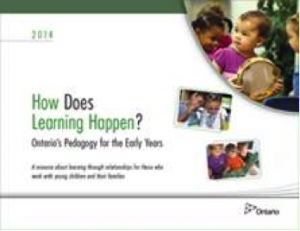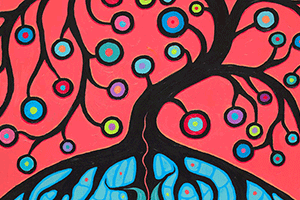How Does Learning Happen?
Ontario’s Pedagogy for the Early Years
How Does Learning Happen? Ontario’s Pedagogy for the Early Years is a professional learning resource for those working in child care and child and family programs. It supports pedagogy and program development in early years settings that is shaped by views about children, the role of educators and families, and the relationships among them. It builds on foundational knowledge about children and is grounded in new research and leading-edge practice from around the world.
How Does Learning Happen? was developed to support Ontario’s renewed vision for the early years. It will help challenge the status quo, inspire critical reflection and transform practices in early years settings. It supports a continuum of learning from early years programs to full-day kindergarten and beyond.
How Does Learning Happen? also describes program expectations, goals for children and questions for reflection to promote learning through collaborative relationships with children, parents, colleagues, and the community. This document will be a catalyst for program integration and supports a common approach to pedagogy across early years settings, and with strong connections to the Full-Day Early Learning Kindergarten Program document.
How Does Learning Happen? and related resources including Think Feel Act: Lessons From Research About Young Children and Excerpts from ELECT are available online at: http://www.edu.gov.on.ca/childcare/pedagogy.html
- Ontario Curriculum Documents
- How Does Learning Happen?
- Full Day Kindergarten
- Extended Day
THE JOURNEY TOGETHER
Ontario’s Commitment to Reconciliation with Indigenous Peoples
Our traditional teachings speak to us about our connection to each other as we move throughout creation, Mino Bimawdiziwin. In order for true reconciliation to happen in this time, we must acknowledge and honour this extended family relationship and our collective commitment to doing things in the best way, thinking seven generations into the future. In taking this walk together we have the knowledge to build a solid foundation for a partnership based on the highest values of respect and kindness. We must fulfill our mutual responsibilities in this spirit of unity. Elder and advisor Shelley Charles, Chippewas of Georgina Island First Nation
All Canadians must now demonstrate the same level of courage and determination, as we commit to an ongoing process of reconciliation. By establishing a new and respectful relationship between Aboriginal and non-Aboriginal Canadians, we will restore what must be restored, repair what must be repaired, and return what must be returned. Excerpt from ‘What We Have Learned: Principles of Truth and Reconciliation,’ 2015
https://files.ontario.ca/trc_report_web_mar17_en_1.pdf
Other Resources & Links
College of Early Childhood Educators
http://www.college-ece.ca/Pages/default.aspx
Greater Essex County District School Board
https://publicboard.ca/Pages/default.aspx
Windsor-Essex Catholic District School Board
http://www.wecdsb.on.ca/
City of Windsor – Social Services
http://www.citywindsor.ca/residents/socialservices-/Pages/Social-Services.aspx
OneHSN
https://onehsn.com/windsor
Windsor-Essex County Health Unit
https://www.wechu.org/
Ontario Ministry of Education
http://www.edu.gov.on.ca/eng/
http://www.edu.gov.on.ca/childcare/
http://www.edu.gov.on.ca/childcare/pedagogy.html
http://www.ontario.ca/children-and-youth/find-and-pay-child-care
Tom Drummond – Learning Stories

